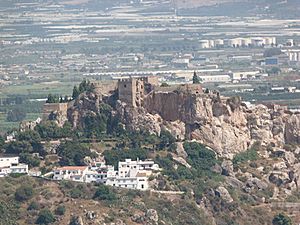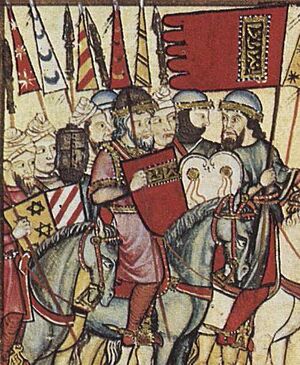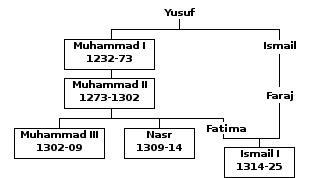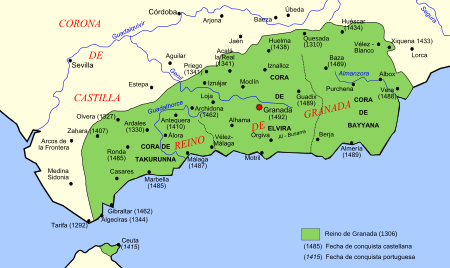Abu Said Faraj facts for kids
Quick facts for kids Abu Said Faraj |
|||||
|---|---|---|---|---|---|
| Governor of Málaga | |||||
| In office | 1279 – early 1310s | ||||
| Predecessor | Umar ibn Mahalli (for the Marinid Sultanate) | ||||
| Successor | Ismail ibn Faraj | ||||
| Born | 1248 | ||||
| Died | 24 April 1320 (aged 71–72) Salobreña, Emirate of Granada |
||||
| Spouse | Fatima | ||||
| Issue | Ismail I, Muhammad | ||||
|
|||||
| Dynasty | Nasrid dynasty | ||||
| Father | Ismail ibn Nasr | ||||
Abu Said Faraj ibn Ismail (أبو سعيد فرج بن إسماعيل, 1248 – 24 April 1320) was an important member of the Nasrid dynasty in Granada. He was a close advisor to two Sultans, Muhammad II (who ruled from 1273 to 1302) and Muhammad III (who ruled from 1302 to 1309). Abu Said also served as the governor of Málaga, a key city, from 1279 until the early 1310s.
He was born in 1248. His father, Ismail ibn Nasr, was the governor of Málaga and the brother of Sultan Muhammad I. After his father died, the Sultan brought young Abu Said to the royal court. There, he became good friends with his cousin, who would later become Sultan Muhammad II. When Muhammad II became Sultan, Abu Said became his trusted advisor. He helped with important decisions about money and the army.
Abu Said married Muhammad II's daughter, Fatima. In 1279, he was made the royal governor of Málaga. This city was the most important port in the kingdom. It had recently been taken back by the crown after a long rebellion. Abu Said worked to bring peace to the people of Málaga. He also helped the region's economy grow. He even started building ships to make Granada's navy stronger. As governor, he led Málaga's soldiers in many battles. These included fighting against rebels and against the Marinid Sultanate from Morocco.
He continued as governor when Muhammad III, his brother-in-law, became Sultan. Abu Said and his wife had a good relationship with Muhammad III. In 1306, he led the Granadan army to conquer Ceuta in North Africa. However, his relationship with the next Sultan, Nasr (who ruled from 1309 to 1314), was not good. In 1311, Abu Said started a rebellion. He wanted his own son, Ismail, to become Sultan instead. His forces captured several castles and defeated Sultan Nasr in battle. But they could not capture the capital city. After this, he was removed as governor of Málaga. This happened because he tried to give the city to the Marinid Sultanate. His son Ismail then imprisoned him. Abu Said remained imprisoned until he died in 1320. Later, Ismail restarted the rebellion and successfully became Sultan Ismail I (who ruled from 1314 to 1325).
Contents
Early Life and Family
Abu Said Faraj was born in 1248. His father was Ismail ibn Nasr. Ismail was the brother of Muhammad I. Muhammad I was the founder of the Nasrid dynasty in Granada. Sultan Muhammad I had made Ismail the governor of Málaga. His father held this job until he died in 1257.
After Ismail's death, Sultan Muhammad I brought his nine-year-old nephew, Abu Said, to his court in Granada. The Sultan then put Abu Muhammad ibn Ashqilula in charge of Málaga. This person was a member of the Banu Ashqilula family. They were allies of the Nasrids at that time.
Life at the Royal Court
At the royal court, Abu Said became good friends with his cousin, Muhammad. This cousin would later become Sultan Muhammad II. Muhammad II was born around 1235 and ruled from 1273 to 1302.
Meanwhile, Málaga became a center for a rebellion. The Banu Ashqilula family started this rebellion in 1266. It lasted for almost twenty years. When Muhammad I died in 1273, Muhammad II became Sultan. Abu Said became the new Sultan's trusted advisor. Even though he was young, he was known for being very smart. He gave advice on money matters and military plans.
Abu Said also married Muhammad II's daughter, Fatima. This made the family ties between the two cousins even stronger. Their first child, Ismail, was born in 1279. In that same year, the Nasrid dynasty finally took Málaga back. The city had been given to the Marinid Sultanate of Morocco by the rebels a year earlier. Abu Said was then appointed to his father's old job as governor of Málaga. He left for Málaga on February 11, 1279. Fatima likely stayed at the royal palace to give birth to Ismail, who was born on March 3.
Governor of Málaga
Málaga was the second largest city in the Emirate of Granada. It was also its most important port on the Mediterranean Sea. Without Málaga, Granada would be like an isolated city surrounded by mountains. Governing Málaga was a big challenge. This was because the city had just been taken back after a rebellion that lasted over ten years. Abu Said was likely chosen because he had experience in managing things. Also, his father had been governor there before.
Abu Said successfully handled these challenges. With his secretary, Ibn Isa, he put new rules in place. He was both firm and gentle, which helped him win over the people of Málaga. He also improved the city's economy. Abu Said became wealthy from the taxes collected in the region. He started a project to build large ships in Málaga. This project made the Nasrid navy very powerful in the years that followed.
He was highly respected because of his royal family connections. People also admired his skills in managing the city and leading the army. He even started receiving special mentions in books and poems. Abu Said also had a younger son named Muhammad.
Nasrid governors had power over their regions. They also commanded the local army. Málaga's soldiers, led by Abu Said, were very important. They helped Muhammad II in his war against the Marinid Sultanate. They also helped take back several Marinid outposts on the Iberian Peninsula. He led important military campaigns near the Strait of Gibraltar. These included areas like Algeciras, Gibraltar, and Tarifa. In 1295–1296, he led a campaign to stop a rebellion in Ronda. This rebellion finally ended when a negotiator was sent to talk with the rebel leader.
Muhammad II died in 1302. His son, Muhammad III, became the new Sultan. Muhammad III was Abu Said's brother-in-law. Abu Said had the Sultan's full trust. He remained governor of Málaga throughout Muhammad III's rule. Abu Said was responsible for taking over Ceuta in North Africa in 1306. The city had rebelled against its Marinid rulers in 1304. On May 12, 1306, a Granadan fleet led by Abu Said arrived. Local supporters welcomed them, and they took over the city without a fight. Taking Ceuta gave Granada control over both sides of the Straits of Gibraltar. But this also made Granada's neighbors angry. Soon, the Marinids, Aragon, and Castile formed an alliance against Granada.
The Rebellion and Downfall
On March 14, 1309, Muhammad III was removed from power. His half-brother, Nasr, became the new Sultan. At the same time, the three powerful neighbors (Marinids, Castile, and Aragon) attacked Granada. This war caused Granada to lose several areas. Ceuta was returned to the Marinids on July 20, 1309. Abu Said likely returned to Málaga after this loss and continued as governor.
Unlike with the previous Sultan, Abu Said and his wife Fatima did not get along well with Nasr. When Abu Said visited the capital, he found that the new Sultan was not popular. Nasr was interested in studying science and building tools for astronomy. People disliked that he spent more time on these hobbies than on state affairs. Also, some suspected him of favoring Christians. This was because his mother was Christian, and he dressed like Castilians. His main advisor also had Christian ties, which added to the dislike. Some people at court met with Abu Said. They asked him to remove Nasr from power. Abu Said was also upset because Muhammad III died while imprisoned. This happened after a failed attempt to put him back on the throne.
Abu Said started an armed rebellion in Málaga in 1311. He announced that his son, Ismail, should be the new Sultan. Ismail was considered to have a stronger claim to the throne. This was because he was a grandson of Muhammad II through his mother, Fatima. Abu Said created a rival court that was loyal to his son. Its power was only recognized within the province of Málaga. In the same year, the Málaga army captured the castles of Antequera, Marbella, and Vélez. The army then moved towards Granada. They defeated Nasr's army in a battle. Sultan Nasr himself lost his horse and had to run back to Granada on foot. Abu Said then tried to surround the capital city. But he did not have enough supplies for a long fight. When he found out that Nasr had allied with Ferdinand IV of Castile, Abu Said sought peace. He was able to keep his job as governor of Málaga. In return, he had to pay tribute to the Sultan.
Abu Said's Imprisonment and Ismail's Rise

Abu Said feared the Sultan's revenge. He sent his secretary to make a secret deal with the Marinids. He offered to give Málaga to them. In return, he would become governor of Salé in North Africa. When the people of Málaga found out, they saw it as a betrayal. They rose up and removed him from power. They chose his son Ismail instead. Abu Said remained free, but Ismail kept a close watch on him in Málaga.
One day, Abu Said visited outside the city. People suspected he was trying to escape. He was captured by the citizens of Málaga. Ismail arrived before his father was harmed. He ordered his father to be imprisoned. Abu Said was moved to a castle in Cártama.
Meanwhile, the plan to remove Nasr continued at court. Ismail restarted the rebellion. He had help from his mother Fatima and a military commander named Uthman ibn al-Ula. As Ismail moved towards Granada, his army grew larger. The people of the capital city opened the gates for him. Nasr was trapped in the Alhambra fortress and palace. He agreed to give up his throne and moved to Guadix.
Ismail became Sultan in 1314. He ordered Abu Said to be moved to the Nasrid royal family prison in Salobreña. Abu Said stayed in this castle until he died on April 24, 1320. His body was brought to the capital. He was buried in the royal cemetery of the Alhambra, near the tomb of Muhammad II. Sultan Ismail I and other important people from Granada attended his funeral. Centuries later, when Granada was surrendered, the last Sultan, Muhammad XII, moved the bodies from this cemetery. He reburied them in Mondújar.
See also
 In Spanish: Abu Sa'id Faray para niños
In Spanish: Abu Sa'id Faray para niños
 | Percy Lavon Julian |
 | Katherine Johnson |
 | George Washington Carver |
 | Annie Easley |




